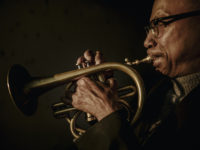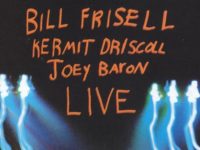feature photo: Monica Jane Frisell via Blue Note Records
Closely following a couple of albums from a live engagement at the Village Vanguard that Bill Frisell performed with bassist Thomas Morgan, the eminent guitarist gets with Morgan and drummer Rudy Royston in the studio for another low-key presentation of kinda folky, kinda jazzy music in all its simple, earthbound splendor. The Blue Note release Valentine like the ECM releases Small Town and Epistrophy before it finds Frisell settled and comfortable, his default state of mind.
It’s near impossible to contextualize a single entry within Bill Frisell’s vast and varied catalog, but Valentine sure feels like a companion to Gone, Just Like A Train. In other words, an Americana-jazz record in a trio setting, produced by Frisell’s go-to guy behind the boards, Lee Townsend.
That comparison may be simplifying it a bit, but Morgan and Royston are worthy heirs to Victor Krauss and the great Jim Keltner. Just the mid-century tone of Frisell’s guitar on Boubacar Traore’s “Baba Drame” and his minimal, unforced delivery with an unmovable rhythm section backing makes this a track easy to imagine on that earlier record. At the same time, Morgan’s acoustic bass wanders from the main path more readily than from Krauss’s and Royston is really active behind the trap set. And then, the song leads right into the extended, drum-less coda “Hour Glass,” where Frisell’s menagerie of loops and samples convey more of a feel than a strain. The Frisell original “Aunt Mary” ends much the same, trippy way, too.
“Valentine” is a straight up twelve bar blues in a jazz walk. Bill Frisell in quintessential fashion plays what is needed to illuminate the harmonics, not his chops. Morgan and Royston likewise mind the whole song on their solo turns. “Levees” is also a blues tune, maybe not in the structural sense, but very much in the texture that Frisell weaves while blurring the lines between rhythm and lead guitar.
Taking the ‘less is more’ maxim almost to extreme, the trio renders “Winter Always Turn to Spring” with a fragile sparseness. But that sparseness makes the guitar notes hang in the air longer and the melody just burrows into your head until you understand why it’s a song worthy to cover. “A Flower Is A Lovesome Thing” is another standard that Frisell can articulate fully and fluidly without any help, so Morgan and Royston justify their existence on this performance with sympathetic backing; Morgan’s accurate bass lines and Royston’s brushes create a patter around Frisell’s resonant guitar.
The true sublimity of Bill Frisell’s guitar playing doesn’t necessarily come from the tone he sets for his guitar, a point driven home by the acoustic guitar he plays on the gentle “Where Do We Go?”. I could have stood for a couple more acoustic guitar tracks like this one just to balance things out a little bit.
Royston is the ‘new’ guy in the Frisell orbit (though a veteran jazz drummer capable of every shade of any idiom), and a point of intrigue for Valentine is what he brings to the already-established Frisell/Thomas dynamic. On “Electricity,” he starts off rather meekly but builds up to a raging fire by the end, Frisell and Morgan staying even-keeled throughout, letting the drummer direct the pulse of the song.
Another longtime Bill Frisell trait is a reverence for old folk tunes. “We Shall Overcome” has long stood as one of the anthems for the whole Civil Rights movement since the late 50s, and here Frisell just floats over a slow but steady groove from Thomas and Royston, the former acting as an effective harmonic component to the guitar.
“What the World Needs Now” is one of Frisell’s prettier covers, and that’s saying something. The intricate architecture of his guitar voicings, the chimes, octaves, mixture of single note and chords to efficiently fill in all the crucial details of this perennial melody. It’s classic Frisell craftsmanship fully dedicated to the beauty of the song.
Sublime simplicity come from attention to the details. Such a Bill Frisell hallmark is found all over Valentine and yet another perfectly fine entry point into his massive discography.
Valentine is set for release on August 14, 2020 from Blue Note Records.
- Ches Smith Quartet – ‘Clone Row’ (2025) - May 30, 2025
- James Brandon Lewis Quartet – ‘Abstraction Is Deliverance’ (2025) - May 27, 2025
- Soft Machine – ‘Drop’ (1971, 2025 remaster) - May 21, 2025




